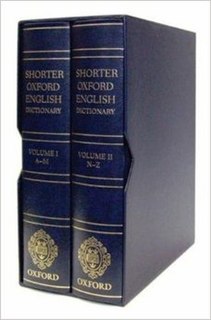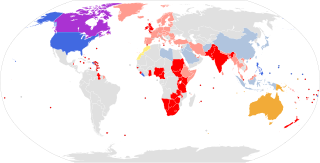Related Research Articles
Impressionism in music was a movement among various composers in Western classical music whose music focuses on mood and atmosphere, "conveying the moods and emotions aroused by the subject rather than a detailed tone‐picture". "Impressionism" is a philosophical and aesthetic term borrowed from late 19th-century French painting after Monet's Impression, Sunrise. Composers were labeled Impressionists by analogy to the Impressionist painters who use starkly contrasting colors, effect of light on an object, blurry foreground and background, flattening perspective, etc. to make the observer focus their attention on the overall impression.

The New Oxford American Dictionary (NOAD) is a single-volume dictionary of American English compiled by American editors at the Oxford University Press.

The Oxford English Dictionary (OED) is the principal historical dictionary of the English language, published by Oxford University Press (OUP). It traces the historical development of the English language, providing a comprehensive resource to scholars and academic researchers, as well as describing usage in its many variations throughout the world.

The Concise Oxford English Dictionary is probably the best-known of the 'smaller' Oxford dictionaries. The latest edition of the Concise Oxford English Dictionary contains over 240,000 entries and 1,728 pages. Its 12th edition, published in 2011, is used by both the United Nations (UN) and NATO as the current authority for spellings in documents written in English for international use. It is available as an e-book for a variety of handheld device platforms. In addition to providing information for general use, it documents local variations such as United States and United Kingdom usage.

The Macquarie Dictionary is a dictionary of Australian English. It is generally considered by universities and the legal profession to be the authoritative source on Australian English. It also pays considerable attention to New Zealand English. Originally it was a publishing project of Jacaranda Press, a Brisbane educational publisher, for which an editorial committee was formed, largely from the Linguistics department of Macquarie University in Sydney, Australia. It is now published by Macquarie Dictionary Publishers, an imprint of Pan Macmillan Australia Pty Ltd. In October 2007 it moved its editorial office from Macquarie University to the University of Sydney, and later to the Pan Macmillan offices in the Sydney central business district.

The Shorter Oxford English Dictionary (SOED) is an English language dictionary published by the Oxford University Press. The SOED is a two-volume abridgement of the twenty-volume Oxford English Dictionary (OED).

The Oxford Advanced Learner's Dictionary (OALD) was the first advanced learner's dictionary of English. It was first published in 1948. It is the largest English-language dictionary from Oxford University Press aimed at a non-native audience. Users with a more linguistic interest, requiring etymologies or copious references, usually prefer the Concise Oxford English Dictionary, or indeed the comprehensive Oxford English Dictionary, or other dictionaries aimed at speakers of English with native-level competence.
Australian English is a major variety of the English language spoken throughout Australia. Most of the vocabulary of Australian English is shared with British English, though there are notable differences. The vocabulary of Australia is drawn from many sources, including various dialects of British English as well as Gaelic languages, some Indigenous Australian languages, and Polynesian languages.
The Canadian Oxford Dictionary is a dictionary of Canadian English. First published by Oxford University Press Canada in 1998, it became a well-known reference for Canadian English.
Robert Malcolm Ward "Bob" Dixon is a Professor of Linguistics in the College of Arts, Society, and Education and The Cairns Institute, James Cook University, Queensland. He is also Deputy Director of The Language and Culture Research Centre at JCU. Doctor of Letters, he was awarded an Honorary Doctor of Letters Honoris Causa by JCU in 2018. Fellow of British Academy; Fellow of the Australian Academy of the Humanities, and Honorary member of the Linguistic Society of America, he is one of three living linguists to be specifically mentioned in The Concise Oxford Dictionary of Linguistics by Peter Matthews (2014).

Despite the various English dialects spoken from country to country and within different regions of the same country, there are only slight regional variations in English orthography, the two most notable variations being British and American spelling. Many of the differences between American and British English date back to a time before spelling standards were developed. For instance, some spellings seen as "American" today were once commonly used in Britain, and some spellings seen as "British" were once commonly used in the United States.

First published in 1918, Kenkyusha’s New Japanese-English Dictionary has long been the largest and most authoritative Japanese-English dictionary. Translators, scholars, and specialists who use the Japanese language affectionately refer to this dictionary as the Green Goddess or (GG) because of its distinctive dark-green cover.
Japanese dictionaries have a history that began over 1300 years ago when Japanese Buddhist priests, who wanted to understand Chinese sutras, adapted Chinese character dictionaries. Present-day Japanese lexicographers are exploring computerized editing and electronic dictionaries. According to Nakao Keisuke (中尾啓介):
It has often been said that dictionary publishing in Japan is active and prosperous, that Japanese people are well provided for with reference tools, and that lexicography here, in practice as well as in research, has produced a number of valuable reference books together with voluminous academic studies. (1998:35)
The Compact Oxford English Dictionary of Current English is a one-volume dictionary published by Oxford University Press. It is intended for a family or upper secondary school readerships. The third edition (revised), published in 2008, has 1,264 pages, somewhat smaller than the Concise Oxford English Dictionary, and is distinct from the "Compact" editions of the multi-volume Oxford English Dictionary.

The Longman Dictionary of Contemporary English (LDOCE), first published by Longman in 1978, is an advanced learner's dictionary, providing definitions using a restricted vocabulary, helping non-native English speakers understand meanings easily. It is available in four configurations:
Daijirin is a comprehensive single-volume Japanese dictionary edited by Akira Matsumura, and first published by Sanseido Books in 1988. This title is based upon two early Sanseidō dictionaries edited by Shōzaburō Kanazawa, Jirin and the revised Kōjirin.
A Dictionary of Canadianisms on Historical Principles (DCHP) is a historical usage dictionary of words, expressions, or meanings which are native to Canada or which are distinctively characteristic of Canadian English though not necessarily exclusive to Canada. The first edition was published by W. J. Gage Limited in 1967. The text of this first edition was scanned and released as a free-access online dictionary in 2013.

The Collins-Robert French Dictionary is a bilingual dictionary of English and French derived from the Collins Word Web, an analytical linguistics database. As well as its primary function as a bilingual dictionary, it also contains usage guides for English and French, English and French verb tables, and maps of English and French speaking areas.

The Oxford Dictionary of English (ODE) is a single-volume English dictionary published by Oxford University Press, first published in 1998 as The New Oxford Dictionary of English (NODE). The word "new" was dropped from the title with the Second Edition in 2003. This dictionary is not based on the Oxford English Dictionary (OED) and should not be mistaken for a new or updated version of the OED. It is a completely new dictionary which strives to represent as faithfully as possible the current usage of English words. The Revised Second Edition contains 355,000 words, phrases, and definitions, including biographical references and thousands of encyclopaedic entries. The Third Edition was published in August 2010, with some new words, including "vuvuzela".
The Australian National Dictionary: Australian Words and Their Origins is a historical dictionary of Australian English, recording 16,000 words, phrases, and meanings of Australian origin and use. The first edition of the dictionary, edited by W.S. Ramson, was published in 1988 by Oxford University Press; the second edition was edited by Bruce Moore at the Australian National Dictionary Centre and published in 2016.
References
- 1 2 Warden, Ian "Some Balltearers For The Scrabble Board" 27 October 1999 Canberra Times P7
- ↑ Lockwood, Kim. "A New Aussie Monolith" 27 October 1999 Herald Sun p 31
- ↑ "Reading between the lines". 28 October 1999 The Advertiser p 19
- ↑ Australian Oxford Dictionary, Oxford University Press web site Archived October 6, 2010, at the Wayback Machine